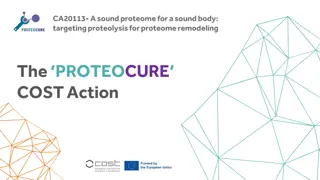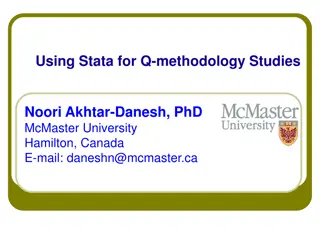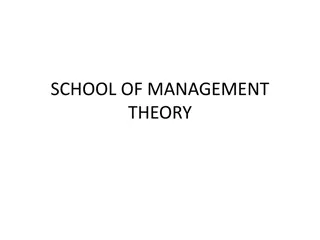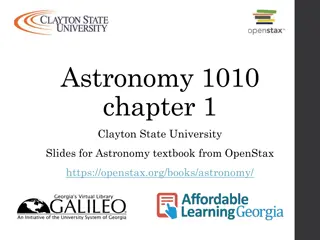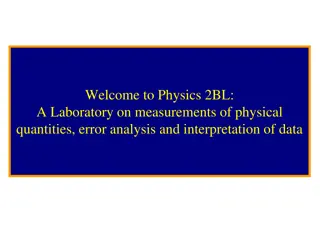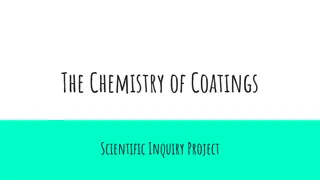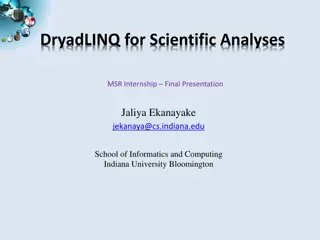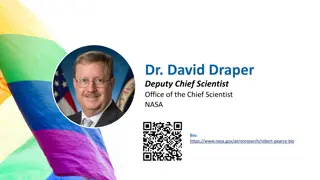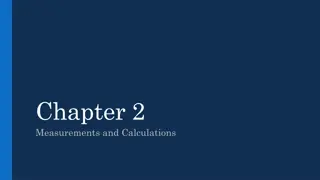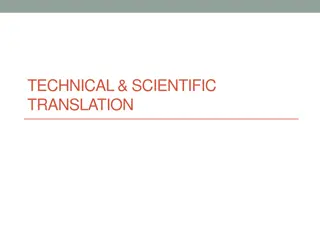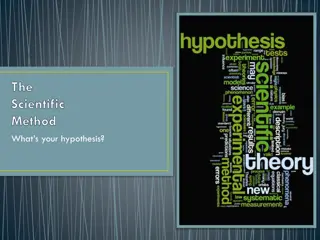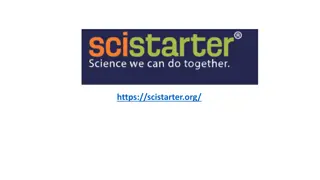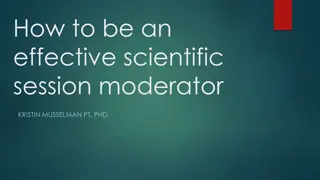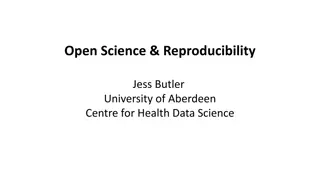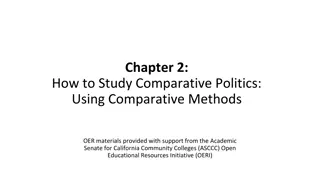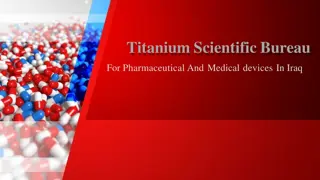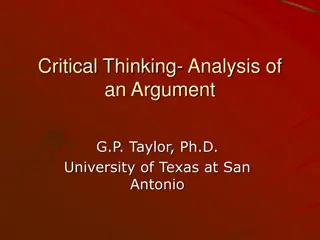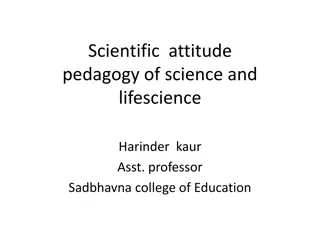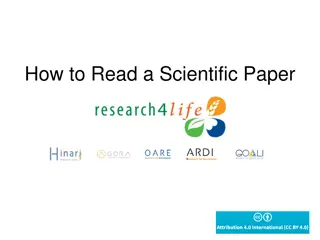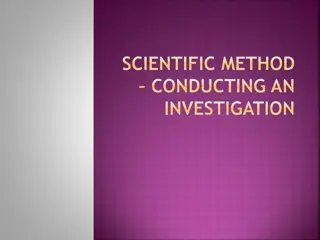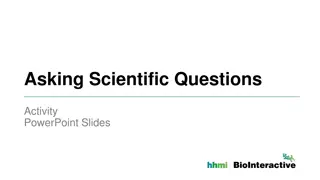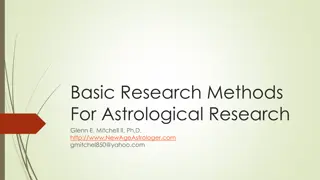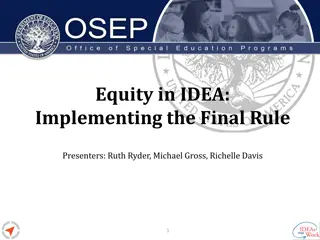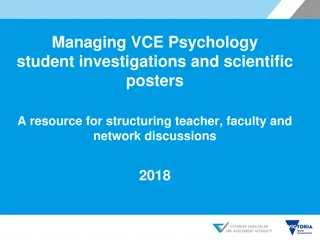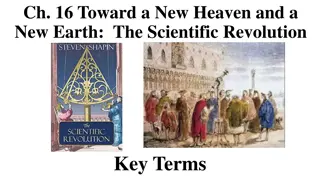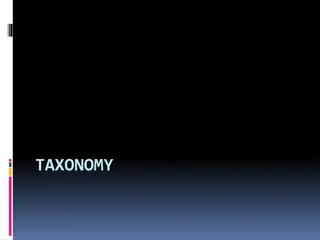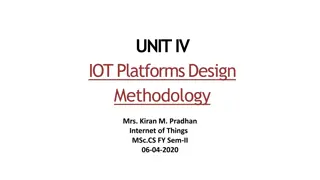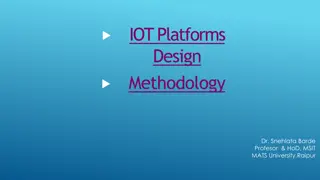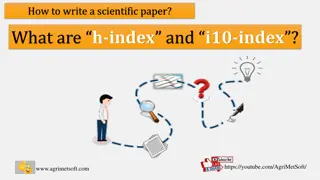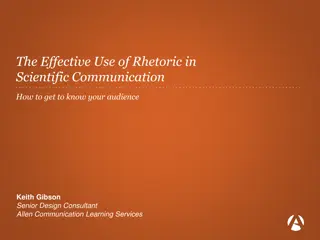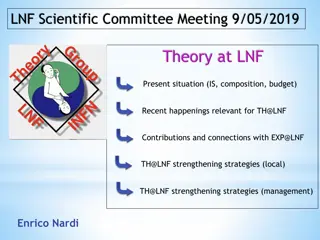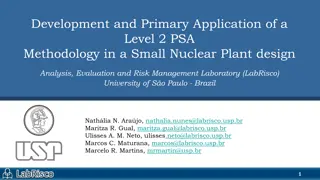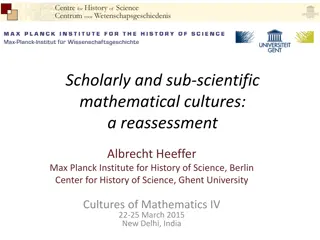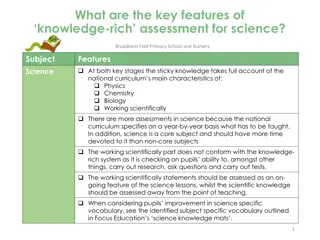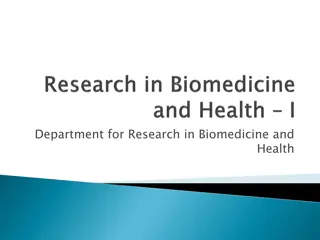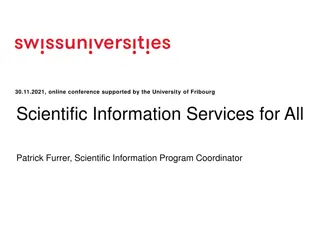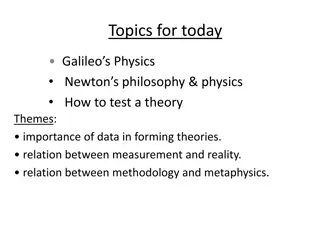Enhancing Scientific Literacy in Early Years Play-Based Learning
This PhD research proposal explores scientific literacy among children in play-based learning, focusing on everyday concepts and their application to scientific understanding. The study aims to implement Vygotsky's sociocultural theory to enhance children's scientific literacy through Vision 1 and V
7 views • 19 slides
Exploring the PROTEOCURE COST Action: Targeting Proteolysis for Proteome Remodeling
The PROTEOCURE COST Action focuses on targeting proteolysis for proteome remodeling, aiming to enhance Europe's scientific and technological capacity through collaboration across various fields and career stages. Participating in this initiative offers financial support, scientific networking, and c
0 views • 17 slides
Understanding Climate Change through Scientific Inquiry
Explore the role of science in addressing climate change, identifying scientific questions, discussing different disciplines involved, and analyzing the strength and limitations of scientific methods. Engage in activities to understand how scientific questions are formulated and categorized for inve
2 views • 22 slides
Understanding Q-Methodology: A Stata Analysis Overview
Q-Methodology is a research approach focusing on subjective viewpoints. This article discusses the history, goals, and steps involved in a Q-methodology study using Stata programs. It covers the development of a concourse, creation of a Q-sample, Q-sorting activities, and analysis and interpretation
5 views • 46 slides
Evolution of Management Theories: Classical Approach and Scientific Management
Explore the evolution of management theories focusing on the Classical Approach and Scientific Management. The Classical Approach emphasizes efficiency and specialization, while Scientific Management introduced systematic methods to increase productivity. Learn about key figures like Frederick Winsl
6 views • 31 slides
Introduction to Astronomy: Exploring the Universe and Scientific Method
Distant galaxies, the oldest science of astronomy, and the scientific method are explored in this content. Astronomy delves into the study of objects beyond Earth, while the scientific method serves as a tool to understand nature through observations and experiments.
6 views • 10 slides
Physics 2BL Laboratory: Measurements, Error Analysis & Data Interpretation
This Physics 2BL laboratory course focuses on measurements of physical quantities, error analysis, and interpretation of data. Students learn how scientists create models of natural phenomena and the practical aspects of conducting scientific experiments. Pre-requisites include Physics 2A, 4A or equ
0 views • 31 slides
The Chemistry of Coatings. Scientific Inquiry Project
Delve into the world of coatings and polymers through scientific inquiry projects, understanding the steps of the scientific method and engineering design. Learn about polymers, epoxies, and their various applications in coatings, adhesives, industrial tooling, electronics, and more.
0 views • 25 slides
Evaluation of DryadLINQ for Scientific Analyses
DryadLINQ was evaluated for scientific analyses in the context of developing and comparing various scientific applications with similar MapReduce implementations. The study aimed to assess the usability of DryadLINQ, create scientific applications utilizing it, and analyze their performance against
0 views • 20 slides
Overview of NASA's Office of the Chief Scientist and Deputy Chief Scientist Dr. David Draper
The Office of the Chief Scientist (OCS) at NASA plays a vital role in advising, advocating, and representing the agency in various scientific matters. Dr. David Draper serves as the Deputy Chief Scientist. The OCS leads initiatives related to scientific integrity, research security, citizen science,
1 views • 11 slides
Understanding the Scientific Method in Measurements and Calculations
Explore the scientific method in detail, including observing, collecting data, formulating hypotheses, testing hypotheses, and formulating theories with practical examples. Understand the importance of experimentation and how it leads to the development of scientific theories. Engage in activities t
3 views • 43 slides
Understanding Scientific Translation: A Vital Tool for Advancing Knowledge
Scientific translation is a specialized practice that involves accurately translating complex terms in fields such as science and technology to facilitate global knowledge exchange and advancement. It requires precision, fidelity to source material, and a deep understanding of technical terminology
0 views • 60 slides
Understanding the Scientific Method: A Logical Framework for Problem-Solving
The Scientific Method is a systematic approach used to solve problems and seek answers in a logical step-by-step manner. By following key steps such as stating the problem, researching, forming a hypothesis, testing, analyzing data, and drawing conclusions, this method helps clarify uncertainties an
0 views • 18 slides
Discover Exciting Citizen Science Projects on SciStarter
Explore a variety of engaging citizen science projects on SciStarter, where you can contribute to scientific research from monitoring bark beetles to studying urban birds. Join projects like Project FeederWatch, Foldit, and Stream Selfie to participate in meaningful scientific initiatives. Get invol
0 views • 7 slides
Effective Scientific Session Moderation with Dr. Kristin Musselman: Tips and Strategies
Enhance your skills as a scientific session moderator with valuable insights from Dr. Kristin Musselman, a renowned PT and PhD. Learn about the key responsibilities of a moderator, tips for effective moderation, and the importance of preparation, time management, and audience engagement. Explore res
0 views • 20 slides
The Importance of Open Science and Reproducibility in Scientific Research
Open Science emphasizes the open sharing of scientific knowledge, research data, and publications. It promotes transparency by making data, methodologies, and results accessible to all. This approach helps in reproducibility, ensuring the reliability and integrity of research findings. By addressing
0 views • 18 slides
Understanding the Scientific Method in Comparative Politics
Exploring the scientific method in political science and comparative politics reveals the systematic approach to acquiring knowledge through observation, hypothesis testing, and analysis of outcomes. Adherence to rules of inference is crucial for validity in scientific research, enabling researchers
0 views • 28 slides
Titanium Scientific Bureau - Leading Pharmaceutical & Medical Devices Agency in Iraq
Titanium Scientific Bureau is a prominent scientific bureau based in Baghdad, with offices in Baghdad and Erbil, specializing in the marketing and distribution of pharmaceutical, medical, and food supplement products in the Iraqi market. They are registered in compliance with Iraqi pharmacists' synd
0 views • 13 slides
Enhancing Critical Thinking Skills in Scientific Research
Critical thinking plays a pivotal role in scientific endeavors, enabling researchers to observe, hypothesize, experiment, and draw valid conclusions. Being a natural skeptic is crucial for scientists to scrutinize research papers effectively. By carefully analyzing prior findings, research technique
2 views • 20 slides
Understanding Scientific Attitude and Pedagogy of Science
Scientific attitude involves open-mindedness, curiosity, rationality, and a desire for accurate knowledge. It includes characteristics such as critical thinking, respect for diverse viewpoints, and a reliance on verified information. Developing a scientific attitude involves studying superstitions,
1 views • 6 slides
Guide to Reading Scientific Papers
Understanding how to read a scientific paper is crucial for researchers and students alike. This guide covers the types of scientific papers, organization of a paper, and the key steps to properly read and comprehend complex scientific information. It explains the different sections of a paper, such
0 views • 20 slides
Understanding the Scientific Method: A Comprehensive Guide
Exploring the scientific method and principles of scientific investigation, this guide covers the mindset of a scientist, steps in the scientific method, and key components like formulating questions, conducting research, creating hypotheses, performing experiments, and analyzing results. It emphasi
1 views • 21 slides
Unveiling the Essence of Scientific Inquiry
Delve into the essence of scientific questioning, exploring the driving force behind scientists' day-to-day work, the elements that define science, and the significance of cause and effect in elucidating natural phenomena. Unravel the world of scientific jargon with engaging activities aimed at fost
0 views • 19 slides
Unveiling the Rigor of Astrological Research and Scientific Scrutiny
Exploring the complex world of astrological research through a comprehensive guide by Glenn E. Mitchell II, Ph.D. Understanding the controversy, challenges, and significance of astrological research, emphasizing the required rigor and scientific methodology. Delve into the essence of science, scient
0 views • 45 slides
Equity in IDEA: Implementing the Final Rule Presentation
Recap the final rule on equity in IDEA, focusing on standard methodology, remedies, important dates, and addressing questions. Discuss the methodology requirements, including data collection on disproportionality and disciplinary actions. Explore the standard methodology components, like risk ratios
0 views • 49 slides
Effective Strategies for Managing VCE Psychology Student Investigations and Scientific Posters
Discover valuable resources and practical approaches for structuring and managing VCE Psychology student investigations and scientific posters, including guidance on scientific poster requirements for Units 3 and 4, evaluating student work, and fostering effective science communication skills.
0 views • 52 slides
Explore the Scientific Revolution
The Scientific Revolution marked a shift from the medieval worldview to a secular, rational, and materialistic perspective. Key terms such as geocentric and heliocentric conceptions, Cartesian dualism, rationalism, and the scientific method played pivotal roles in shaping this transformative period.
5 views • 10 slides
Understanding Taxonomy and Scientific Classification
Explore the world of taxonomy and scientific classification, from the discipline of classifying organisms to assigning scientific names using binomial nomenclature. Learn the importance of italicizing scientific names, distinguish between species, and understand Linnaeus's system of classification.
0 views • 19 slides
IoT Platforms Design Methodology for Efficient System Development
Designing IoT systems can be complex due to the interactions between various components like devices, network resources, web services, analytics, applications, and servers. This article presents a generic design methodology for IoT systems that is independent of specific products or services, leadin
1 views • 8 slides
IoT Platforms Design Methodology by Dr. Snehlata Barde - Overview
Designing IoT systems can be complex, but with a generic methodology like the one proposed by Dr. Snehlata Barde, designing, testing, and maintaining IoT systems becomes more efficient. The methodology focuses on purpose, requirements, process specification, domain model specification, information m
0 views • 9 slides
Understanding H-Index and I10-Index in Scientific Research
The h-index and i10-index are important metrics in evaluating a researcher's impact and productivity in scientific research. The h-index indicates the number of publications with at least the same number of citations, while the i10-index counts the number of publications with at least 10 citations.
0 views • 13 slides
Mastering Rhetoric in Scientific Communication
Understanding and utilizing rhetoric effectively in scientific communication is essential for engaging audiences. By knowing your audience, employing Aristotelian reasoning, and building metaphors, you can enhance the impact of your message. Additionally, storytelling plays a crucial role in captiva
0 views • 22 slides
LNF Scientific Committee Meeting Update
The LNF Scientific Committee Meeting on 9/05/2019 discussed the present situation, composition, budget, recent developments, contributions, and strengthening strategies. It highlighted the exploration of new physics, budget allocations, staff updates, and scientific activities. Recommendations were
0 views • 15 slides
Development and Primary Application of Level 2 PSA Methodology in Small Nuclear Plant Design Analysis Lab
The study at the LabRisco in University of São Paulo, Brazil focuses on developing and applying a Level 2 Probabilistic Safety Assessment methodology for a small nuclear plant design evaluation. The work entails identification of severe accident scenarios, analysis of nuclear systems, and construct
0 views • 17 slides
Reassessing Scholarly and Sub-Scientific Mathematical Cultures
Scholarly and sub-scientific mathematical cultures are reevaluated through the works of Jens Hoyrup, focusing on the organized nature of sub-scientific knowledge. The distinction between theoretical and practical knowledge, applications to mathematical cultures, and misconceptions related to the sup
0 views • 53 slides
Key Features of Knowledge-Rich Assessment for Science at Broadbent Fold Primary School
Sticky knowledge in science assessment at Broadbent Fold Primary School encompasses Physics, Chemistry, Biology, and Working Scientifically. Assessments are detailed due to the structured national curriculum, with a focus on specific scientific vocabulary and practical applications. The ongoing asse
0 views • 20 slides
Comprehensive Training Program in Biomedicine and Health Research
The Department for Research in Biomedicine and Health offers a detailed training program focusing on foundational medical knowledge, clinical disciplines, and research methodology. The program includes theoretical learning, practical application, and evidence-based medicine components. Assessment is
0 views • 8 slides
Scientific Services for All - Enhancing Scientific Information and Services
This online conference, supported by the University of Fribourg, focuses on providing scientific information and services for all. Led by Patrick Furrer, the Scientific Information Program Coordinator, the event delves into creating a network of services, developing a coordination structure, and sho
0 views • 12 slides
Quiz Review on Scientific Method and Graphing
Explore a quiz review covering topics related to scientific method, graphing, and experimental design. Understand key concepts such as hypothesis, scientific law, theory, variables, and experimental control through detailed questions and images. Test your knowledge on laboratory safety, inferences,
0 views • 14 slides
Understanding Galileo's Physics and Newton's Philosophy
Explore the intersection of Galileo's terrestrial physics experiments, Galileo's physics discoveries, and Newton's philosophy and physics. From challenging Aristotelian views to introducing concepts like equivalence, inertia, and relativity, delve into the evolution of scientific thought on measurem
0 views • 22 slides

